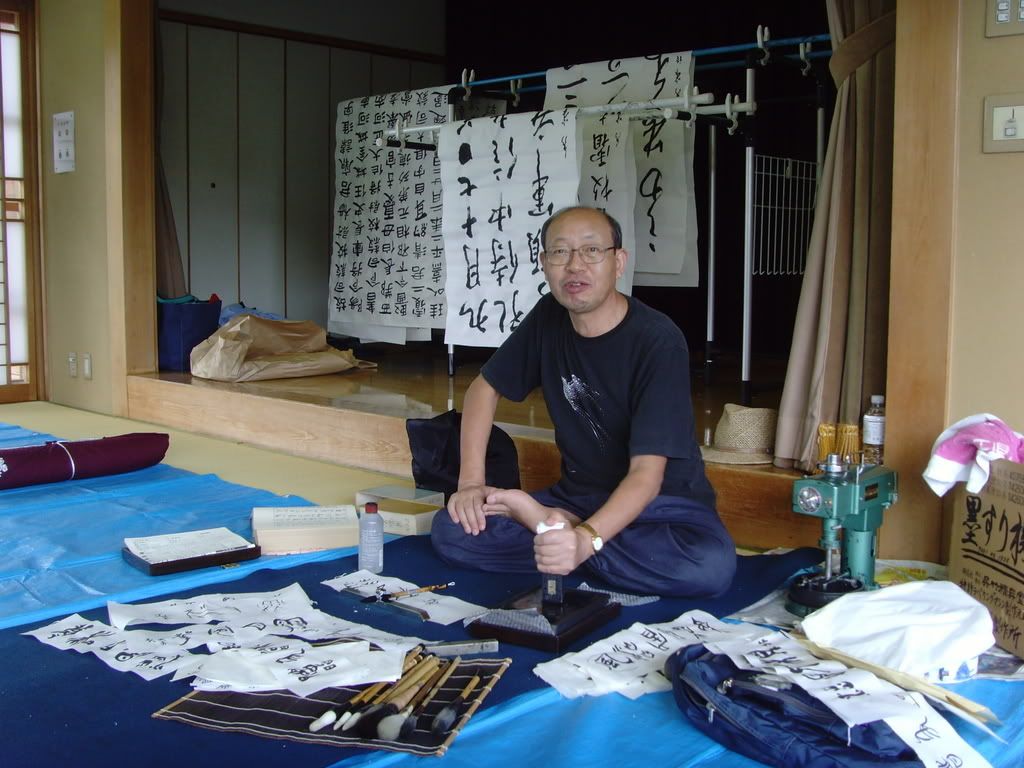I needed some more material for the exhibition, so I killed two birds with one stone by interviewing my host mum and practicing with the video camera at the same time. It's my first time filming anything, so I was all worried and paranoid, but once it started up, it was cool. I just had it up on a tripod anyways.
My host mum is incredibly straightforward and open about everything. I didn't really feel like any question I could possibly ask her would be uncomfortable for her. So we just chatted. She has a lot of interesting things to say, and most of all, she's comfortable with just talking. I noticed this more later when I was trying to talk to the ladies in the English class. I suppose it's also a language barrier thing, since they have to try to speak in a foreign language, but last class, when we were talking about manga, everyone was talking over everyone else. They all had something to say. This time, it was rather hesitant.
I suppose it also has to do with the people who ended up coming. We were missing Te-chan and Takeda-san. Te-chan, once she interested in something, has a lot to say about it. Takeda-san is amazingly good at understanding things in context so she makes a really good conversant when the rest of the group has stopped with question marks popping around their heads.
They apparently had some sort of falling out, though, Takeda-san and everyone else. Te-chan was just busy that day, I think. She came to the next class.
One of the most interesting things I find among this group of women is how sensitive they are to everyone else's feelings. This entire group of women spent weeks discussing in person or talking on the phone and trying this and that and even holding meetings about how to tell Takeda-san that she wasn't wanted anymore. I think Takeda-san had a somewhat difficult personality and it was disrupting the group. In any case, for a couple of weeks, my host mum was constantly on the phone for hours, talking about this and that. In the end, they even tried direct confrontation, but I don't think that worked. Takeda-san just got mad at my host mum and stopped coming to English class.
Well, I don't really know how it all ended, but the hubbub is over and I haven't seen Takeda-san since the first time I met her.
Everyone always talks about how the Japanese ostracize people that are different and how unfeeling they can be, but among these women, I found a real, deep emotion over something as simple as not hurting another's feelings. Maybe it's because they are mothers, but when confronted with the choice of the group over the individual, they still don't want to hurt the individual. What might be somewhat distasteful for the American who is reading this might be the fact that the group was chosen over the individual. Or maybe all Westerners would feel that way. But it is simply a different way of thinking, and I have come to appreciate it even if I don't always agree.
After all, it is this way of thinking that allows them to so genuinely worry and care for a complete stranger who has come to stay among them for three months and then, perhaps, to wander away again and never come home again. I don't think I've ever felt more taken care of than while I stayed here, where my host mum will call every 3.5 minutes until I pick up when she's worried whether I'll catch my bus to Kyoto, where my host grandmum will come home from Sea World with a little present and an embarrassed smile for me, where my little host sister imitates my way of talking and her older sister patiently explains a word in Japanese that I didn't understand, and where my host grandpa starts crying when he thinks about me leaving for the States.
Tuesday, December 4, 2007
Sunday, October 28, 2007
Yoyogi Park Take Two
So, here's a little wrap-up for those who wanna know what happened with all that Yoyogi Park band.
I went to Yoyogi with a friend of mine, since we both needed to take some pictures (me for a photo class, him for a communications class). This time, I actually went into the park instead of hanging around the street next to it. The interior didn't look too promising the last time I went, but that was a Monday. This, my friends, was a Sunday.
On our way to the park, there were lots of people performing: three man bands, a single person on the piano, a break-dancing group. They were all too close to each other the music blended from one to the next as you walked down the street.
When we got alongside the park, we had to walk down the sidewalk to get to the entrance; the same sidewalk where I had met Saturday Night Bremen before. This day, there were far more people on the sidewalk--lots of people selling used stuff and bands tossed in between. There were a lot more things to see than on a Monday. Well anyhow, as we walked down this rather long sidewalk, who should I see but Saturday Night Bremen. We kinda passed slowly along and I kinda waved and Chizuru-san kinda freaked out at the coincidence. Nice people.
We talked for a bit, I introduced my friend, the subject of their upcoming live came up (of course) and I decided on the spot that I would go. I wanted to go before this chance meeting, but I didn't want to if I didn't get anyone to go with me. So I admit it--I used the situation to try to coerce my buddy into coming along with me -.- Well, it worked, and it was off to the live we go ^^ But first, the park.
I wanted to go before this chance meeting, but I didn't want to if I didn't get anyone to go with me. So I admit it--I used the situation to try to coerce my buddy into coming along with me -.- Well, it worked, and it was off to the live we go ^^ But first, the park.
Right at the entrance to the park, there were the rock-a-billies. Middle-aged men with big hair, sunglasses, leather pants, tatoos, no shame, and some...incredible...dance moves.
If outside the park was for rock bands and hip hop, then the inside of the park was for indigenous musics. Not necessarily indigenous to Japan. Indigenous to somewhere. They had people on bagpipes. I'll leave it at that.
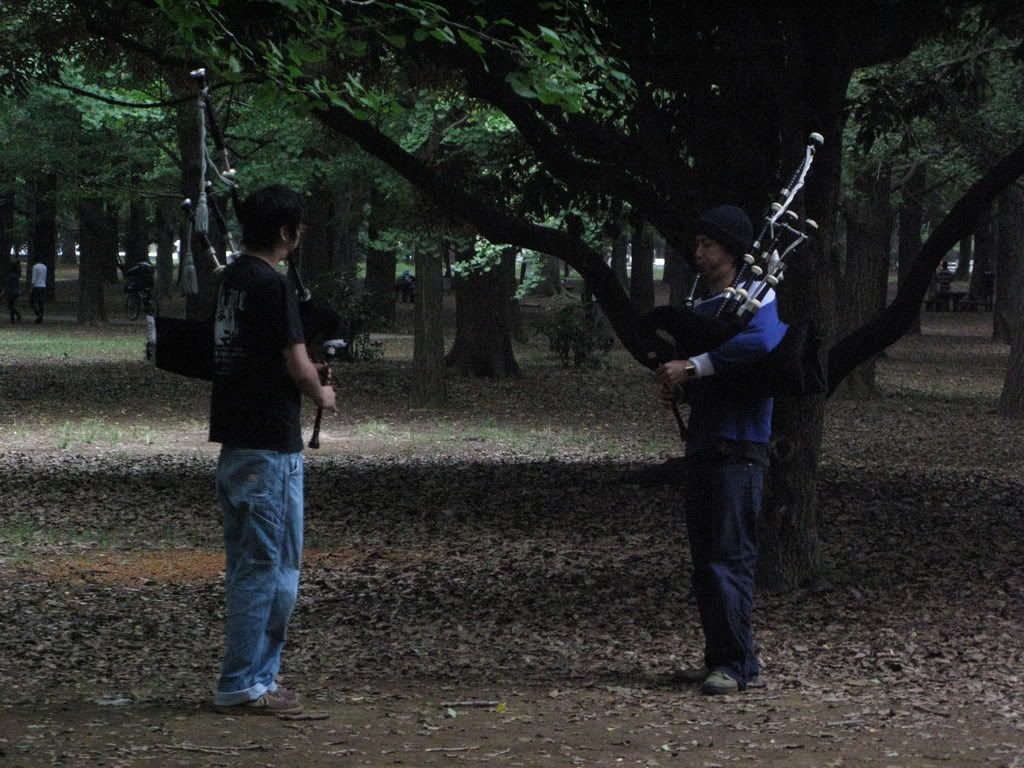
After that came Wednesday, the night of the live (yes, it was that close). Me and my friend headed out to Shibuya and promptly could not find the place for the life of us. Fortunately, Justin's got a good sense of direction so we finally sniffed the place out and got in at the last song of the first band. The live house was...small. Much smaller than I had expected somehow. Full of cigarette smoke and whatever blasting song was playing next, with a little space given over for people. The music was so loud that it really seemed like there was no room for anything else physically or mentally. It was loud enough that there were a couple of times that I got dizzy from it.
Saturday Night Bremen was the star of the evening--they played last. Before them played some group whose name I can't remember because we barely made it for their last song. The other group, Lucy Juicy, did mostly a pop-ish, happy sort of rock with a cutesy girl as their lead. What was interesting about their music was the variety. Just as me and Justin were saying talking about how it would be great if they had a sort of metal-ish, not so bouncy song, here comes the minor key. It was interesting, this band. The instruments played really well together. The singer, I think, could've added more to the music--in short, she needed practice. She does, however, pull off a great performance and does a good job as a front man.
Saturday Night Bremen really showed off at the end. The difference in experience was really obvious as soon as they started playing. Couldn't tell you what it was. Can tell you that it was good. Then again, everyone in that room had come to see them, not the starter bands.
Anyways, the live ended and me and Justin headed back home. We didn't get to talk much with the band members--expected, I suppose, consider that I'd only met them three times. We chatted with the lead singer and the electric guitarist outside for a little bit as they took a break from loading their van.
I probably won't run into them again, as I don't really have any further plans to go to Yoyogi. We'll see what happens. If nothing else, maybe I'll get to see them whenever it is that I finally return to Japan after this semester.
I went to Yoyogi with a friend of mine, since we both needed to take some pictures (me for a photo class, him for a communications class). This time, I actually went into the park instead of hanging around the street next to it. The interior didn't look too promising the last time I went, but that was a Monday. This, my friends, was a Sunday.
On our way to the park, there were lots of people performing: three man bands, a single person on the piano, a break-dancing group. They were all too close to each other the music blended from one to the next as you walked down the street.
When we got alongside the park, we had to walk down the sidewalk to get to the entrance; the same sidewalk where I had met Saturday Night Bremen before. This day, there were far more people on the sidewalk--lots of people selling used stuff and bands tossed in between. There were a lot more things to see than on a Monday. Well anyhow, as we walked down this rather long sidewalk, who should I see but Saturday Night Bremen. We kinda passed slowly along and I kinda waved and Chizuru-san kinda freaked out at the coincidence. Nice people.
We talked for a bit, I introduced my friend, the subject of their upcoming live came up (of course) and I decided on the spot that I would go.
 I wanted to go before this chance meeting, but I didn't want to if I didn't get anyone to go with me. So I admit it--I used the situation to try to coerce my buddy into coming along with me -.- Well, it worked, and it was off to the live we go ^^ But first, the park.
I wanted to go before this chance meeting, but I didn't want to if I didn't get anyone to go with me. So I admit it--I used the situation to try to coerce my buddy into coming along with me -.- Well, it worked, and it was off to the live we go ^^ But first, the park.Right at the entrance to the park, there were the rock-a-billies. Middle-aged men with big hair, sunglasses, leather pants, tatoos, no shame, and some...incredible...dance moves.
If outside the park was for rock bands and hip hop, then the inside of the park was for indigenous musics. Not necessarily indigenous to Japan. Indigenous to somewhere. They had people on bagpipes. I'll leave it at that.

After that came Wednesday, the night of the live (yes, it was that close). Me and my friend headed out to Shibuya and promptly could not find the place for the life of us. Fortunately, Justin's got a good sense of direction so we finally sniffed the place out and got in at the last song of the first band. The live house was...small. Much smaller than I had expected somehow. Full of cigarette smoke and whatever blasting song was playing next, with a little space given over for people. The music was so loud that it really seemed like there was no room for anything else physically or mentally. It was loud enough that there were a couple of times that I got dizzy from it.
Saturday Night Bremen was the star of the evening--they played last. Before them played some group whose name I can't remember because we barely made it for their last song. The other group, Lucy Juicy, did mostly a pop-ish, happy sort of rock with a cutesy girl as their lead. What was interesting about their music was the variety. Just as me and Justin were saying talking about how it would be great if they had a sort of metal-ish, not so bouncy song, here comes the minor key. It was interesting, this band. The instruments played really well together. The singer, I think, could've added more to the music--in short, she needed practice. She does, however, pull off a great performance and does a good job as a front man.
Saturday Night Bremen really showed off at the end. The difference in experience was really obvious as soon as they started playing. Couldn't tell you what it was. Can tell you that it was good. Then again, everyone in that room had come to see them, not the starter bands.
Anyways, the live ended and me and Justin headed back home. We didn't get to talk much with the band members--expected, I suppose, consider that I'd only met them three times. We chatted with the lead singer and the electric guitarist outside for a little bit as they took a break from loading their van.
I probably won't run into them again, as I don't really have any further plans to go to Yoyogi. We'll see what happens. If nothing else, maybe I'll get to see them whenever it is that I finally return to Japan after this semester.
Monday, October 22, 2007
Saturday, October 13, 2007
The Architecture Student Incident
So...
My original idea for this project had been centered around Koshigaya, which is why I put up the Noh interviews and whatnot. Then, we got the option in class to work with an architecture student (if they were willing). The catch was that you could only do certain parts of Tokyo. I really wanted to work in a collaborative project, so I jumped right on that and changed my theme to Japanese Indie rock bands. Hence, Yoyogi Park.
But, after the weeks of fuddering and meeting this teacher and that student, only one architecture student ended up pairing up with someone and that someone wasn't me. After a couple of more weeks of fuddering, it suddenly dawned on me that I didn't have to struggle with going to Yoyogi all the time (waaaaaaay out of the way) and spend tons of money going to lives and buttering up band members. Instead, I could just go back to my original (and more interesting to me) idea: Koshigaya.
Of course, that means that I'm somewhat behind in the work and need to get caught up with all that. We'll see how this goes...
My original idea for this project had been centered around Koshigaya, which is why I put up the Noh interviews and whatnot. Then, we got the option in class to work with an architecture student (if they were willing). The catch was that you could only do certain parts of Tokyo. I really wanted to work in a collaborative project, so I jumped right on that and changed my theme to Japanese Indie rock bands. Hence, Yoyogi Park.
But, after the weeks of fuddering and meeting this teacher and that student, only one architecture student ended up pairing up with someone and that someone wasn't me. After a couple of more weeks of fuddering, it suddenly dawned on me that I didn't have to struggle with going to Yoyogi all the time (waaaaaaay out of the way) and spend tons of money going to lives and buttering up band members. Instead, I could just go back to my original (and more interesting to me) idea: Koshigaya.
Of course, that means that I'm somewhat behind in the work and need to get caught up with all that. We'll see how this goes...
Sunday, September 23, 2007
Yoyogi Park Take One
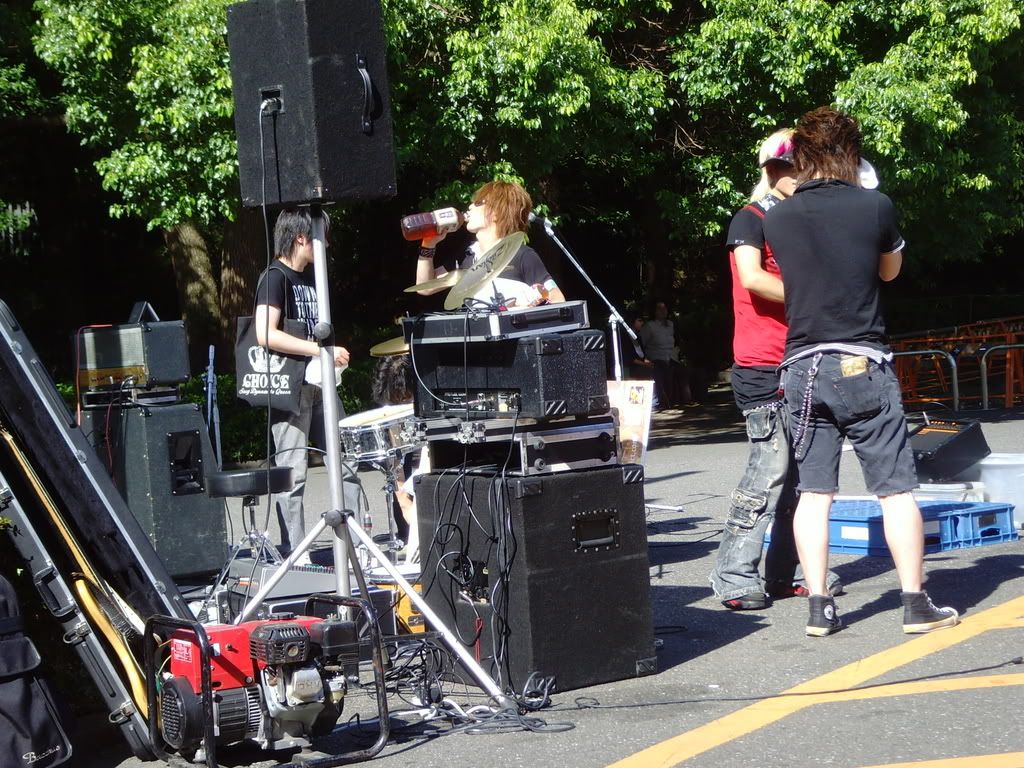 Last Monday, on I had a school holiday, so I took the chance to head over to Yoyogi Park in Harajuku. It was supposed to be my introduction into the world of indie music, namely indie rock, here in Japan. Well, I guess it was something of an introduction, since I got my foot in the door, but it was little more than that.
Last Monday, on I had a school holiday, so I took the chance to head over to Yoyogi Park in Harajuku. It was supposed to be my introduction into the world of indie music, namely indie rock, here in Japan. Well, I guess it was something of an introduction, since I got my foot in the door, but it was little more than that.I only saw two bands there; apparently Sundays are the days to go, not Monday. I hear that they used to close the street next to Yoyogi Park and indie bands down line up all along the road and play. They don't close the street anymore--a sign of some change in the underground music world??--but bands still show up to play. On Sundays.
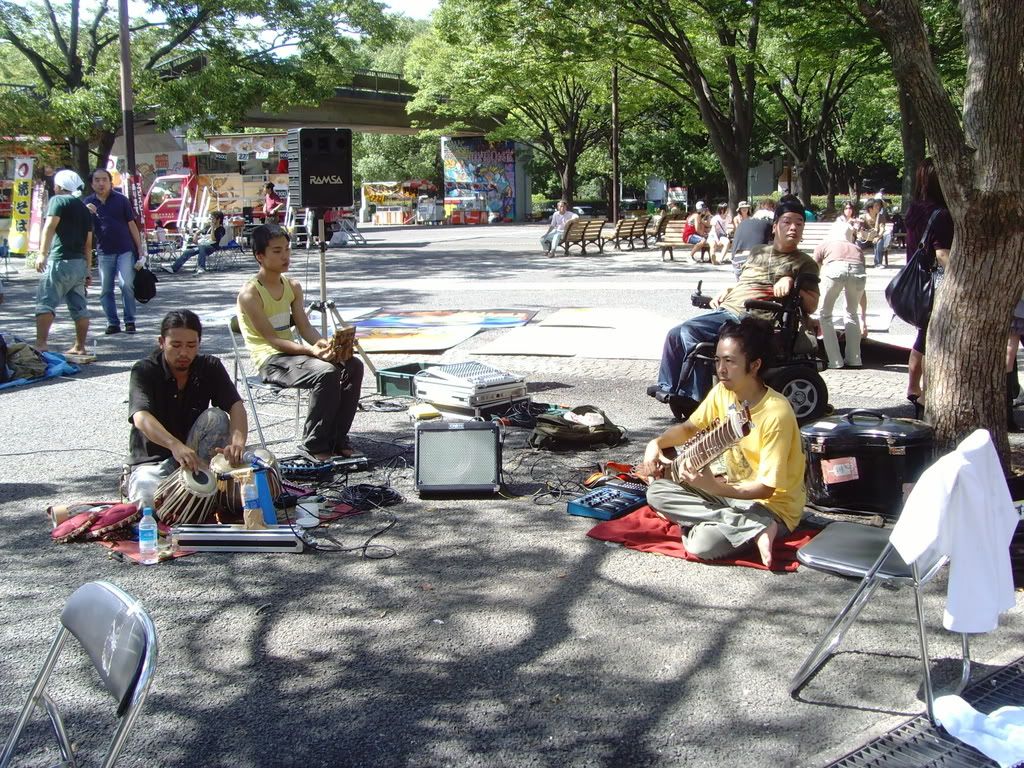 Well, when I got there, there were only two rock bands and neither was playing, so I took a looksee across the street where something was going on. It turned out to be a "Peace Festival" and there were hippies!! A little group of three were playing some music on some instruments I've never seen before. The people there really were at "peace" too. So at peace that some of them (if they weren't one of the girls lined up next to the street for god-knows-what) were asleep, blissfully unaware of a certain devious picture-taker sitting right next to them, using a yakisoba lunch as her cover.
Well, when I got there, there were only two rock bands and neither was playing, so I took a looksee across the street where something was going on. It turned out to be a "Peace Festival" and there were hippies!! A little group of three were playing some music on some instruments I've never seen before. The people there really were at "peace" too. So at peace that some of them (if they weren't one of the girls lined up next to the street for god-knows-what) were asleep, blissfully unaware of a certain devious picture-taker sitting right next to them, using a yakisoba lunch as her cover.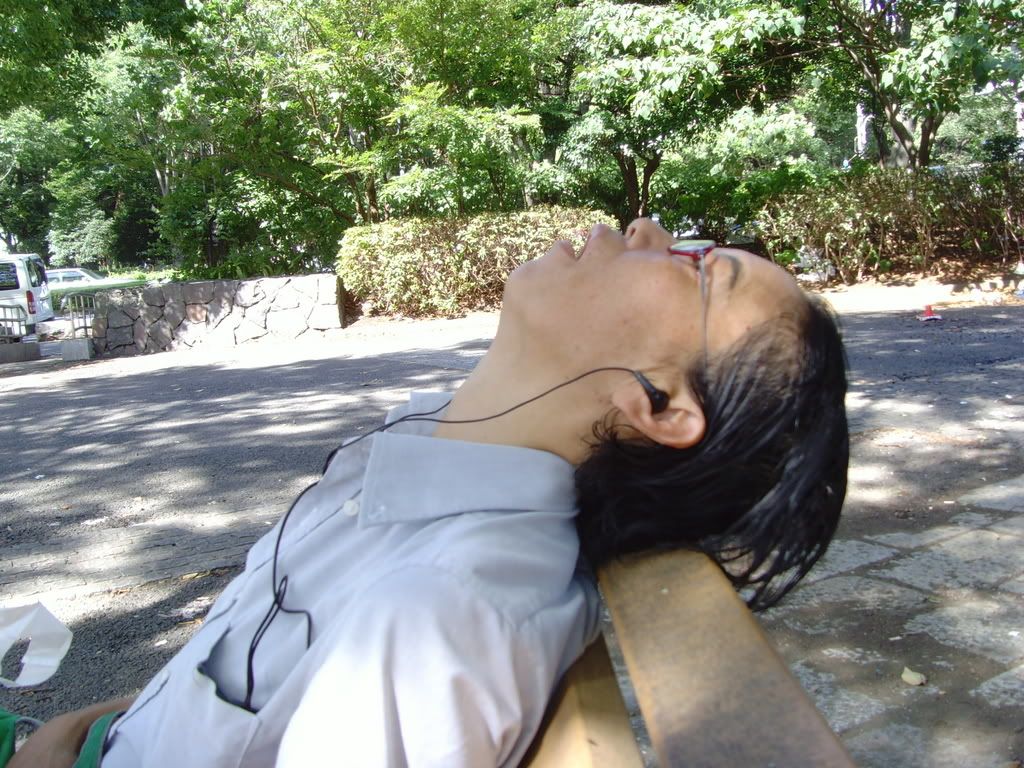
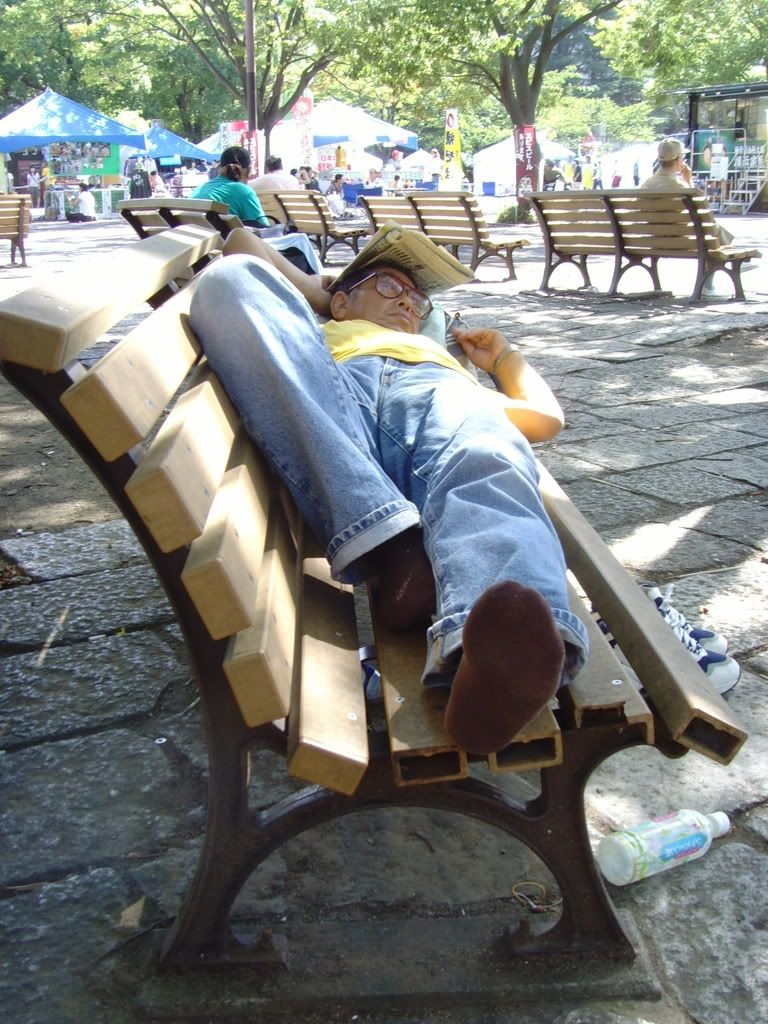 Well, after lunch and a few pictures, I headed back to the park to see what I could see, or rather hear what I could hear, and lo and behold, one of the bands was playing-- Success!! I watched them play and at the end of it, I went up and bought their single and their mini-album. Since I was the only person buying anything, they of course took notice and told me that they'd start playing again in just a little bit. I was a bit shy, so I hurried off--a failure as an interviewer!--but came back and watched them when they started playing again. It was a good move, since after that, the band members and their manager (I think she was?) started talking to me during their breaks.
Well, after lunch and a few pictures, I headed back to the park to see what I could see, or rather hear what I could hear, and lo and behold, one of the bands was playing-- Success!! I watched them play and at the end of it, I went up and bought their single and their mini-album. Since I was the only person buying anything, they of course took notice and told me that they'd start playing again in just a little bit. I was a bit shy, so I hurried off--a failure as an interviewer!--but came back and watched them when they started playing again. It was a good move, since after that, the band members and their manager (I think she was?) started talking to me during their breaks.So the band is called Saturday Night Bremen (Samstag Nacht Bremen! cried the German girl who stopped to watch), and consists of a drummer, bass guitarist, electric guitarist, and acoustic guitarist/lead singer. Their music was not, perhaps, spectacular but their performance wasn't half bad. Every single one of them was very into their music. They managed to get a few people to stop and listen, but just a few. They have a live show coming up in October. I'll try to hit that and see if I can't cultivate a better relationship with the band members--the language barrier was a bit awkward. At the very least, I'll get a looksee at other bands and my first Japanese live house experience. Saturday Night Bremen might or might not be prime material for my final project, but they all seemed like good people, even if they are (as their manager swore) a little crazy. And anyways like I said, the expedition was just to get my foot in the door.
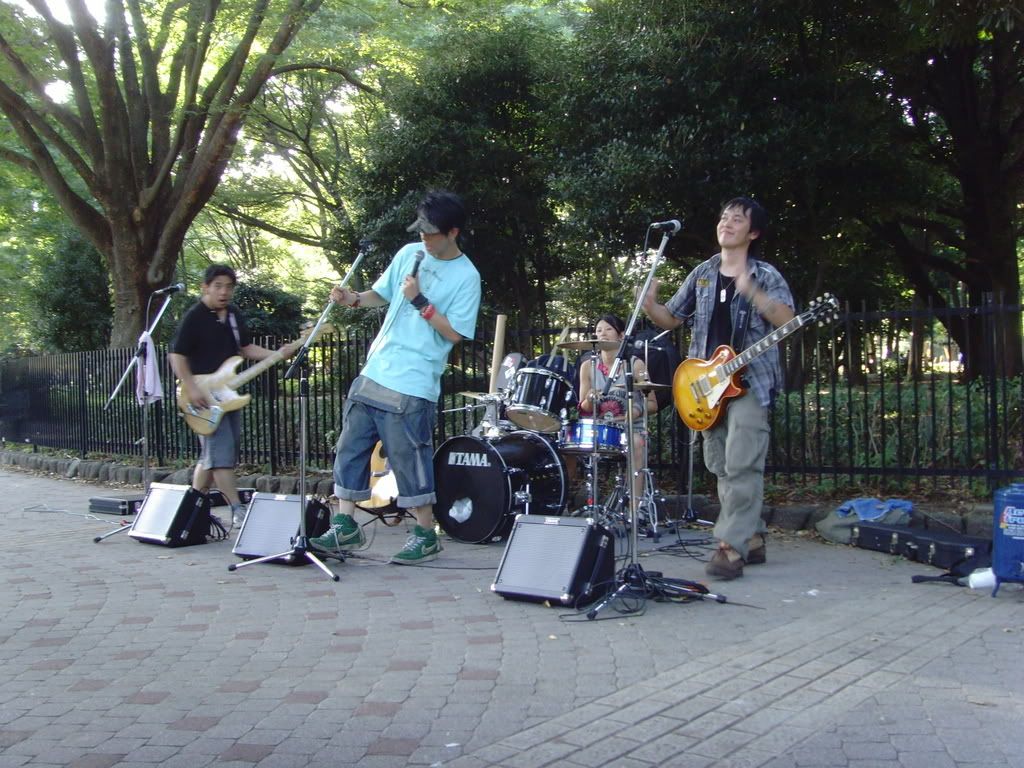
Monday, September 10, 2007
Noh Theater Interview
Here's a (rather rough) translation of the interview with the Noh Theater manager, Mr. Matsumoto. He said some stuff in English, which I put in quotation marks. Just to make things easier to type, I am B (for Becky) and he is M (for Matsumoto):
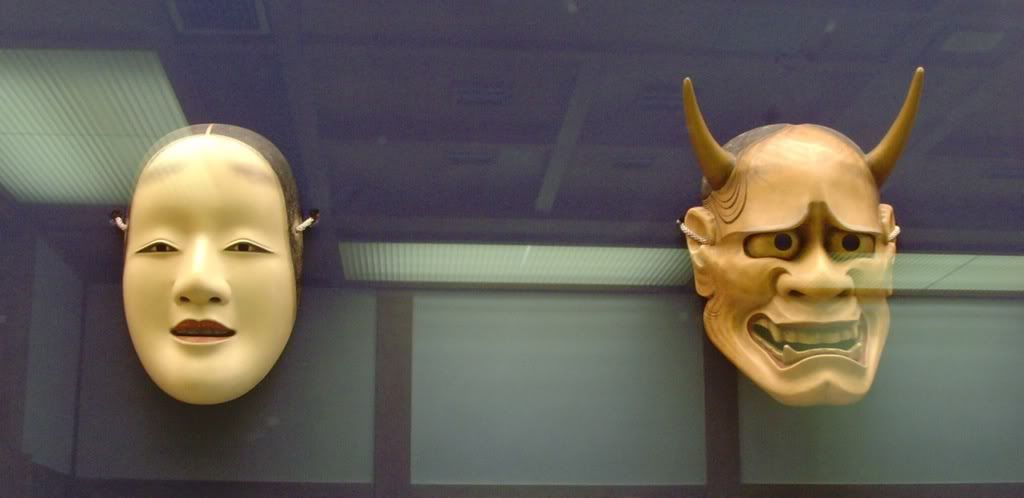
M: If it's about the Noh Theater, then this is good--
B: First, could you please introduce yourself?
M: Ah, a self-introduction. I am Matsumoto, the manager at this Noh Theater. This Noh Theater was, from now, 17 years..."17 years old." 17 years ago this building was built. In Japan, there are 63 of these buildings. "Places." There are 63 of them, and this one is the only one in the Saitama prefecture. There are three reasons why this theater was built: Japanese culture--to spread it, to raise the quality of culture among the citizens of Koshigaya, and to raise the level of communication among acquaintances. If was for these three reasons that this building was created. Do you understand?
B: Just a little.
M: Just a little? Well, Noh Theater is--there are three very old, traditional arts in Japan: Noh--this Noh. It's written here, see? "Noh is oldest of the classical dance dramas in Japan" is written. Well, one of the oldest cultural arts is Noh. And, do you know of Kabuki?
B: Yes, I know of it.
M: And then there is the puppet theater. That is when they use dolls. "Doll." Those are the three famous Japanese cultural arts. Three of them. "Three"--how would you say--"oldest classcial drama in Japan." Three of them, and one of them is Noh. It was to raise that bit of culture that this theater was made. Well, then let's take a look at the peculiarities of this theater.
[walking]
M: This is the costume the actors wear when they go on-stage, go out on the "stage."
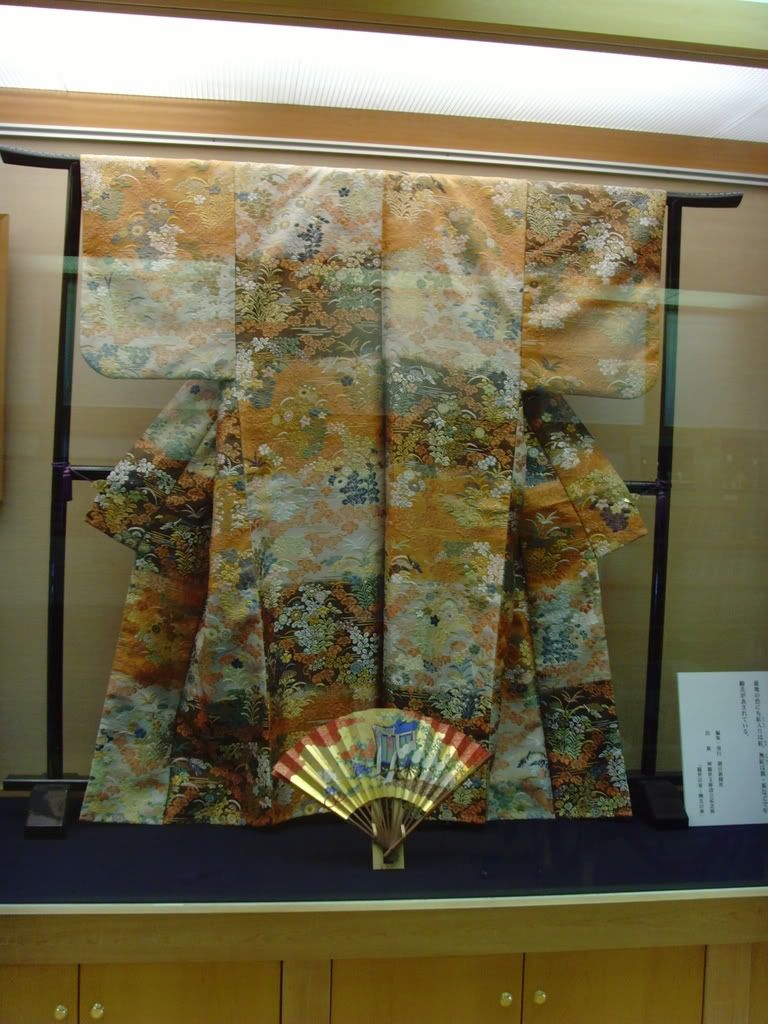 It's called shozoku. In English, I suppose it would be something like "dress." They put this on and...This is the mask. In Japanese, you write it with that character. It can be pronounced "men" but it's also pronounced "omote." An omote is a mask that is worn on the face. The masks that exemplify the rest are--total there are "240 kinds of omote," around 240 of them. And we are talking about the ones that exemplify all of those. And this is, one of the masks that exemplify the omote, the Hanya. This one is the Young Woman. It's the "lady." Is it "lady?" Well, anyways, "woman." A woman. This [the Hanya] is also one. "Too." This is also a Young Woman, but when she is mad with anger.
It's called shozoku. In English, I suppose it would be something like "dress." They put this on and...This is the mask. In Japanese, you write it with that character. It can be pronounced "men" but it's also pronounced "omote." An omote is a mask that is worn on the face. The masks that exemplify the rest are--total there are "240 kinds of omote," around 240 of them. And we are talking about the ones that exemplify all of those. And this is, one of the masks that exemplify the omote, the Hanya. This one is the Young Woman. It's the "lady." Is it "lady?" Well, anyways, "woman." A woman. This [the Hanya] is also one. "Too." This is also a Young Woman, but when she is mad with anger. B: Ah.
M: When she is mad with anger, her face becomes like this.
B: Is that so?
M: Do you understand?
B: Yes.
M: When she is mad with anger, it's this. Well, these are the masks that exemplify the omote. These are the masks that exemplify the 240+ masks that might appear. So, wearing this sort of thing on their face and wearing this sort of costume, the actors dance on the stage. Dancing is "dance." In English, I suppose it would be "dance." And they sing. How can I explain what singing is?
B: Singing?
M: Singing. When you send out your voice. For example--"for example"--
[Sings]
M: Sending out your voice like that. They have the dress on and do something like this.
The Noh Theater
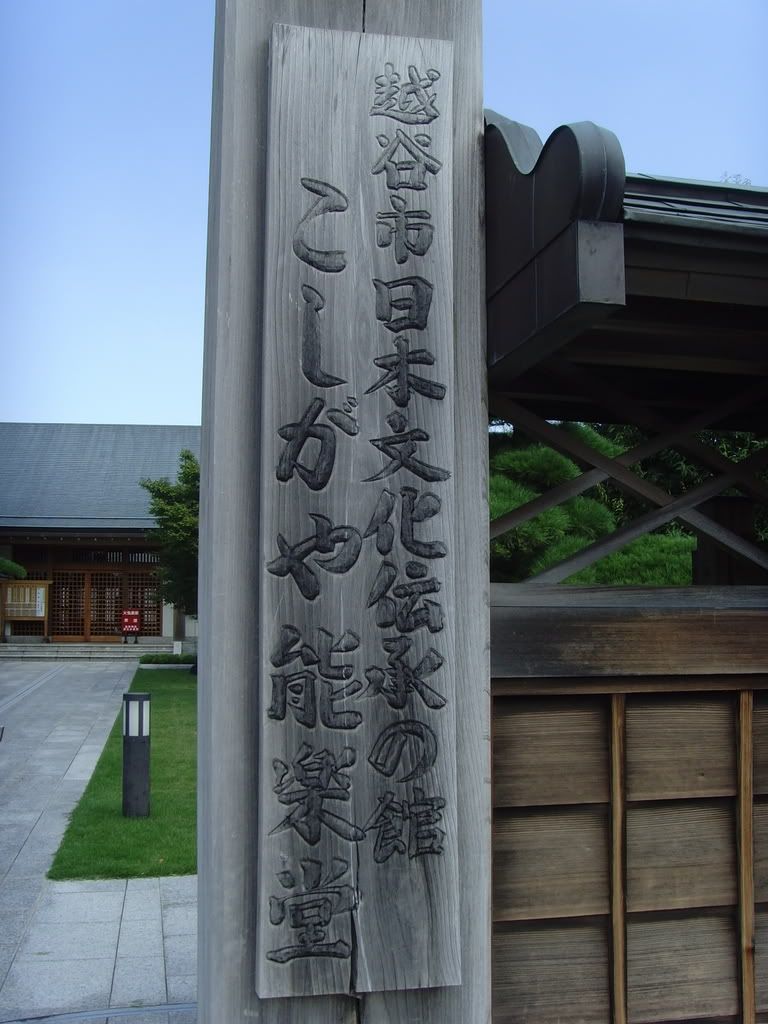 I went to the Noh theater in my neighborhood in Koshigaya city. This Noh theater is the only Noh theater in Saitama prefecture. The first time I went, the weather was good and I got a good look around. The theater is pretty small and was pretty empty, since there wasn't anything going on that day. There are rooms there that people use for tea ceremony and calligraphy and such, but there weren't any such classes there the first time I went. There were, however, a few people in Hanataen, the imitation Japanese garden that's in back of the theater.
I went to the Noh theater in my neighborhood in Koshigaya city. This Noh theater is the only Noh theater in Saitama prefecture. The first time I went, the weather was good and I got a good look around. The theater is pretty small and was pretty empty, since there wasn't anything going on that day. There are rooms there that people use for tea ceremony and calligraphy and such, but there weren't any such classes there the first time I went. There were, however, a few people in Hanataen, the imitation Japanese garden that's in back of the theater.I say imitation, but I thought it was pretty impressive. In fact, I didn't really think it was an imitation. According to my host mother, though, an authentic Japanese garden can only be one that was owned by an actual samurai family.
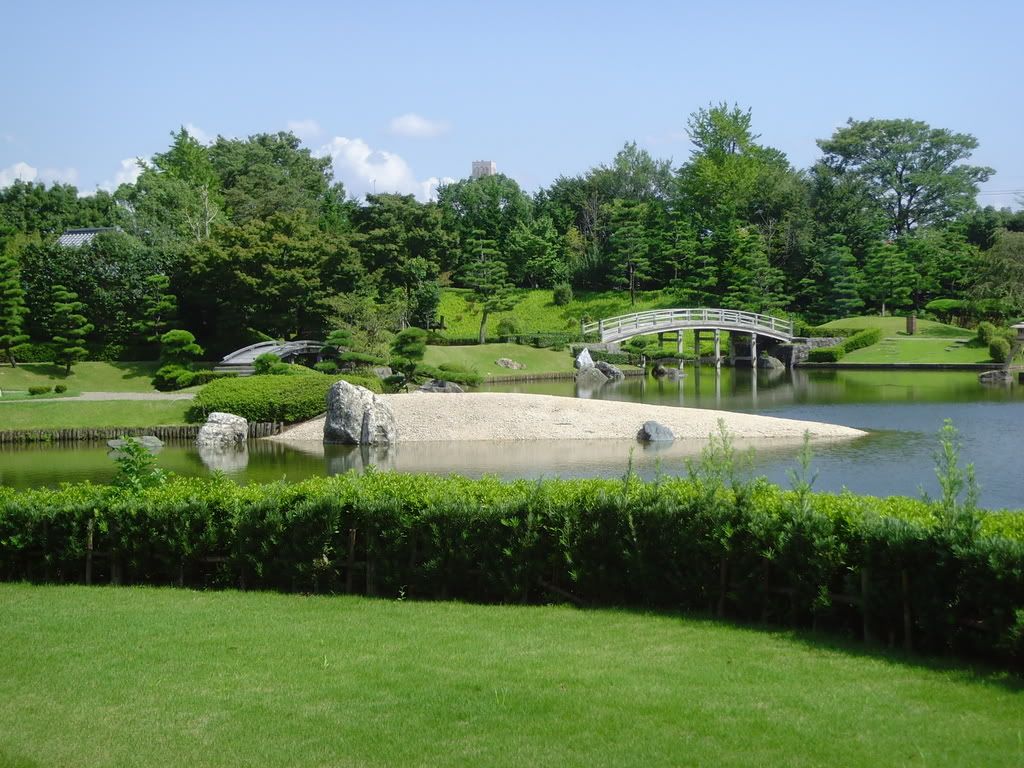 There are a few still preserved around the Tokyo area, but most of the gardens you see around here were apparently made later to imitate those gardens. It was strange for me to think of it that way, since "gardens" aren't exactly something you would think can become extinct. It's something like the idea that a castle isn't a real castle unless it was built in a century prior to the 20th. If all the castles in the world were suddenly destroyed in a series of catastrophes, then there would be no more castles in the world. Even if someone built a castle from the ground up, it wouldn't be a real castle because, well, it wouldn't. How could it be authentic? The age of castles is past and the very function of a castle is now useless. In short, the castle would only be built for perks and for the bragging rights. The same goes, I guess, for the authentic Japanese garden.
There are a few still preserved around the Tokyo area, but most of the gardens you see around here were apparently made later to imitate those gardens. It was strange for me to think of it that way, since "gardens" aren't exactly something you would think can become extinct. It's something like the idea that a castle isn't a real castle unless it was built in a century prior to the 20th. If all the castles in the world were suddenly destroyed in a series of catastrophes, then there would be no more castles in the world. Even if someone built a castle from the ground up, it wouldn't be a real castle because, well, it wouldn't. How could it be authentic? The age of castles is past and the very function of a castle is now useless. In short, the castle would only be built for perks and for the bragging rights. The same goes, I guess, for the authentic Japanese garden.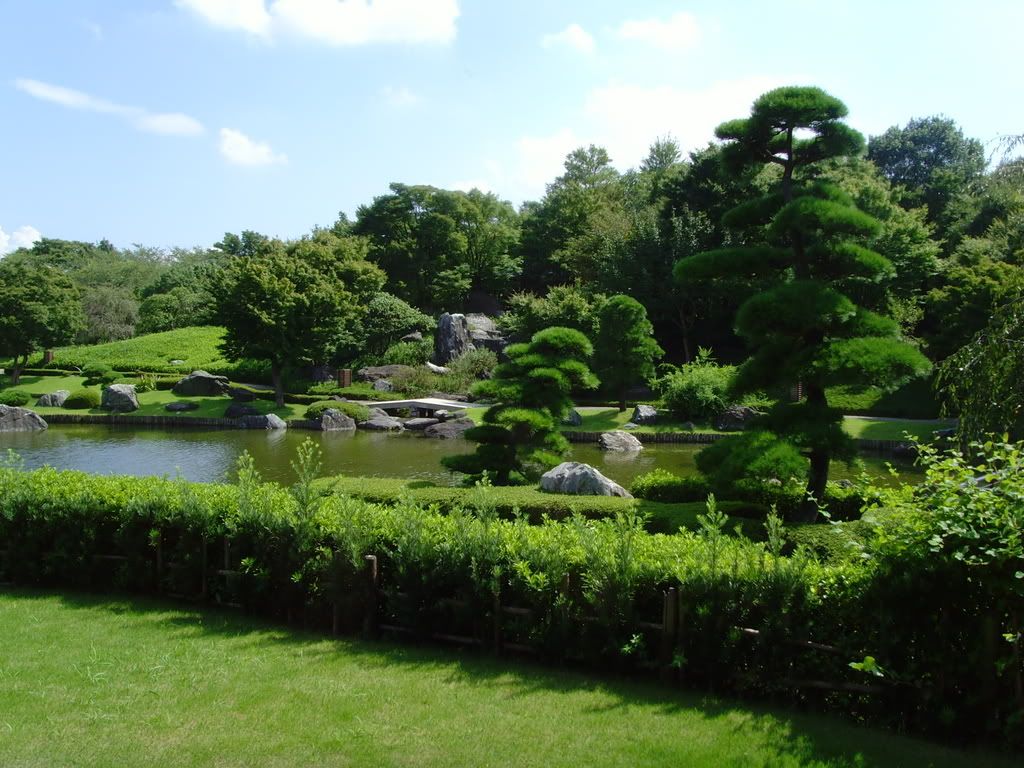
Anyways, back to the Noh theater. I managed to get an interview with the manager of the staff at the theater, and also with a calligraphy teacher/artist who happened to have a class there when I was interviewing the first guy. I'll translate the two interviews and add a link to the actual interviews later. They're in Japanese, but if you wanna listen, feel free.
Wednesday, September 5, 2007
Closed!!
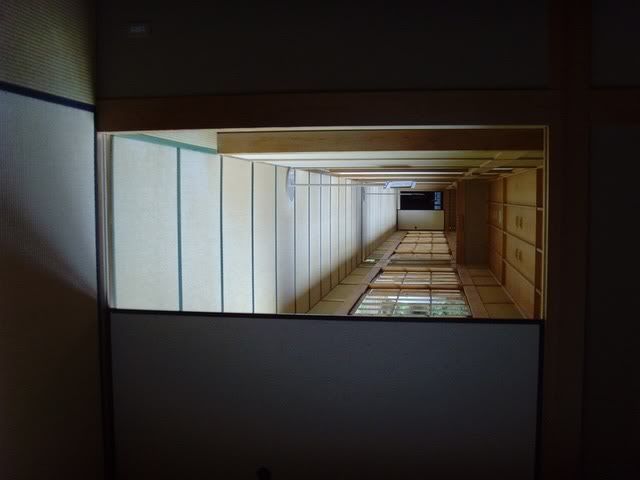 My host mum recently told me about a Noh theater in the area and I went to go check it out. I went over the weekend when the weather was fairly nice (though not sunny) and took a look around. We had to take off our shoes to go into the building and it was really quiet and peaceful and I liked it a lot. Apparently, the Noh Theater isn't used just for Noh. There are rooms that people rent out to do tea ceremonies and calligraphy and stuff. My host mum says that one of her friends rents out a room every now and then to do tea ceremony.
My host mum recently told me about a Noh theater in the area and I went to go check it out. I went over the weekend when the weather was fairly nice (though not sunny) and took a look around. We had to take off our shoes to go into the building and it was really quiet and peaceful and I liked it a lot. Apparently, the Noh Theater isn't used just for Noh. There are rooms that people rent out to do tea ceremonies and calligraphy and stuff. My host mum says that one of her friends rents out a room every now and then to do tea ceremony.It seems that they'll have a Noh play sometime in the the next couple of weeks. If I can, I'm gonna go!!
The theater also has a large garden out back. You have to pay 100 yen (about USD 1) to go into it, but you can see it from inside the building. I spotted a few people I might accost for an interview. Mostly, it was all older people, middle-aged or so, but I saw a kid or two as well.
-----------
So I decided to go today to interview someone, today being a relatively free day for me. But of course, it had to start raining--meaning the chances of people going to the theater went to practically nil. I thought, though, that I could at least get to interview a clerk.
Didn't happen. My host mum drove me over to the theater, and lo and behold, it was CLOSED.
So that was my exciting adventure for today. I'll have to go back Saturday maybe and see if I can get that interview -.- At least I didn't have to bike around in the rain.
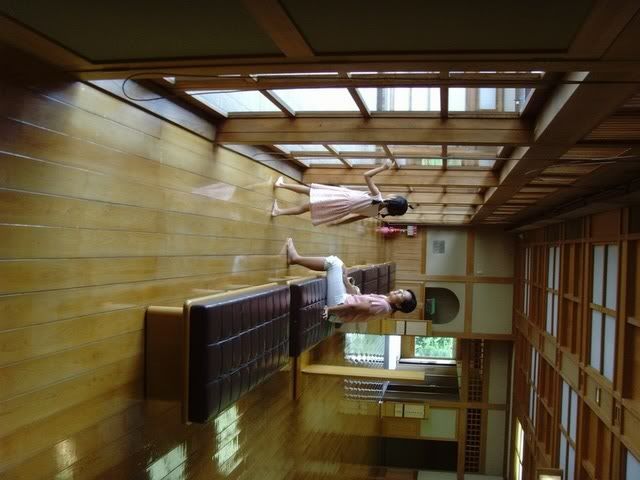
Monday, September 3, 2007
On Tokyo, the Impermanent Capital
In the West, "raw" nature might seem to be a sort of colossal, unopposable force, but in Japan, the grandeur is packageable. As a result of these differing opinions, the Western garden and the Japanese garden are distinctly different in the way each approaches nature. The Western garden only handles controllable natural forces, flowers and trees and bushes, which can be handled and pruned and watered all as individuals. The celebration of nature in a Western garden is in the more controllable aspects of nature. In effect, a Western garden avoids "raw" nature. The Japanese garden is completely the opposite. It seems to take the greater aspects of nature and make them controllable. A mighty waterfall becomes a tiny drop in a miniature river. A soaring mountain becomes a little rocky mound. And, unlike the Western garden, the Japanese garden achieves a cohesiveness that the Western garden lacks. The Western garden is a garden; simply a place to go and look at the flowers and trees and have a sit or take a walk, but still a part of the rest of the world. The Japanese garden is like a little world unto itself.
In terms of space in Japan, I agree with the generally acknowledged idea that the Japanese have to deal with much much smaller space allowances than Americans. Not that that means that a Japanese person does not particularly need or appreciate a greater amount of space. Rather, as the article states, a Japanese person would probably be more jealous and more appreciative of extra space than a California born-and-bred could ever be. Indeed, the very existence of such a thing as a tokonoma suggests that the Japanese have long suffered a lack of space (and privacy) that a person such as I have never conceived of. I don't particularly find the tiny spaces of Japan intolerable or even uncomfortable, but I do feel anxious sometimes when I'm in a car (people seem to freely pass over all sorts of lines while driving in Japan) and I am always amazed at how close vehicles can get without hitting each other. Indeed, I'm amazed at how I have not seen a single personal car that is significantly banged up or even scratched. California, for all its wide roads, does not sport half so many untouched cars. Of course, all that might simply signify is that cars around Tokyo move slower and therefore have fewer accidents, but I'm inclined to think that the sheer number of cars and crazy things that drivers do in Japan more than make up for differences in average speed. For example, on the first day in Japan while my host family was driving me home, my host mum decided she wanted a drink. Her dad, who was driving, spotted a vending machine and stopped in the road, let her off, and even reversed.
I'm not exactly sure of all the roles of "form" around Koshigaya, my homestay city, but by this time, I am certain of one thing: though I've been told by several native Japanese that I look native Japanese, I think I give people the vague impression that I am not Japanese for several reasons. First of all, it seems that all the people around my neighborhood fall into three categories: students in school uniform, office workers in suits (men), and housewives accompanied by small children. I don't obviously fall into any of these categories, resulting in the first look. I am also rather tall for an Asian woman and often stand hipshot rather than trim and prim on the train, resulting in the second look. Lastly, I might whip out a book in English or talk to one of my English-speaking friends, resulting in the furtive stare. I think that maybe even without those, I would still give the impression of being slightly wrong--the impression that I didn't really belong in the in-group no matter what I looked like.
According to Tokyo, the Impermanent Capital, Tokyo is like a collection of many small villages; namely, that each small neighborhood block functions as one without regard to the rest of the city. This results in a rather confusing array of small circles of influence that only an insider would understand intimately. It could perhaps be something akin to the push and pull among cliques of neighborhood kids around their usual hang-out spots. It isn't something that is really planned or ever discussed explicitly, but the boundaries are there. Koshigaya has some of the same elements, though perhaps more spread out, since the city isn't so jam-packed as Tokyo. It always surprises me just how many people my host mum seems to know in the neighborhood. I suppose that that sort of thing might be expected even back in America, but I myself don't know anyone in my neighborhood. The people that I know who live in the same city are all friends from childhood or from high school, none of whom I contact regularly. But my host mum and her friends exchange lessons in this and that with each other. It seems that all the "mamas" that know each other form a sort of network to fill up their days learning whatever another mama might know. For example, my host mum gives lessons in English, and takes lessons from different friends in flower arrangement, painting, sumi-e, and more. I think the village-like arrangement of Japanese cities makes for good community interaction and it seems like knowing someone in a given city is a way in that you must have. The community feeling is still strong enough to let insiders know immediately who the outsiders are. The whole insider-outsider thing makes a strong impression on a person and I find myself getting a little sucked into it--I find myself wanting to be in rather than out, and then kicking myself for it since I (and the rest of America, I suppose) pride myself on being independent.
In terms of space in Japan, I agree with the generally acknowledged idea that the Japanese have to deal with much much smaller space allowances than Americans. Not that that means that a Japanese person does not particularly need or appreciate a greater amount of space. Rather, as the article states, a Japanese person would probably be more jealous and more appreciative of extra space than a California born-and-bred could ever be. Indeed, the very existence of such a thing as a tokonoma suggests that the Japanese have long suffered a lack of space (and privacy) that a person such as I have never conceived of. I don't particularly find the tiny spaces of Japan intolerable or even uncomfortable, but I do feel anxious sometimes when I'm in a car (people seem to freely pass over all sorts of lines while driving in Japan) and I am always amazed at how close vehicles can get without hitting each other. Indeed, I'm amazed at how I have not seen a single personal car that is significantly banged up or even scratched. California, for all its wide roads, does not sport half so many untouched cars. Of course, all that might simply signify is that cars around Tokyo move slower and therefore have fewer accidents, but I'm inclined to think that the sheer number of cars and crazy things that drivers do in Japan more than make up for differences in average speed. For example, on the first day in Japan while my host family was driving me home, my host mum decided she wanted a drink. Her dad, who was driving, spotted a vending machine and stopped in the road, let her off, and even reversed.
I'm not exactly sure of all the roles of "form" around Koshigaya, my homestay city, but by this time, I am certain of one thing: though I've been told by several native Japanese that I look native Japanese, I think I give people the vague impression that I am not Japanese for several reasons. First of all, it seems that all the people around my neighborhood fall into three categories: students in school uniform, office workers in suits (men), and housewives accompanied by small children. I don't obviously fall into any of these categories, resulting in the first look. I am also rather tall for an Asian woman and often stand hipshot rather than trim and prim on the train, resulting in the second look. Lastly, I might whip out a book in English or talk to one of my English-speaking friends, resulting in the furtive stare. I think that maybe even without those, I would still give the impression of being slightly wrong--the impression that I didn't really belong in the in-group no matter what I looked like.
According to Tokyo, the Impermanent Capital, Tokyo is like a collection of many small villages; namely, that each small neighborhood block functions as one without regard to the rest of the city. This results in a rather confusing array of small circles of influence that only an insider would understand intimately. It could perhaps be something akin to the push and pull among cliques of neighborhood kids around their usual hang-out spots. It isn't something that is really planned or ever discussed explicitly, but the boundaries are there. Koshigaya has some of the same elements, though perhaps more spread out, since the city isn't so jam-packed as Tokyo. It always surprises me just how many people my host mum seems to know in the neighborhood. I suppose that that sort of thing might be expected even back in America, but I myself don't know anyone in my neighborhood. The people that I know who live in the same city are all friends from childhood or from high school, none of whom I contact regularly. But my host mum and her friends exchange lessons in this and that with each other. It seems that all the "mamas" that know each other form a sort of network to fill up their days learning whatever another mama might know. For example, my host mum gives lessons in English, and takes lessons from different friends in flower arrangement, painting, sumi-e, and more. I think the village-like arrangement of Japanese cities makes for good community interaction and it seems like knowing someone in a given city is a way in that you must have. The community feeling is still strong enough to let insiders know immediately who the outsiders are. The whole insider-outsider thing makes a strong impression on a person and I find myself getting a little sucked into it--I find myself wanting to be in rather than out, and then kicking myself for it since I (and the rest of America, I suppose) pride myself on being independent.
Subscribe to:
Comments (Atom)



